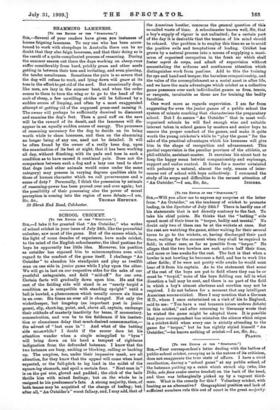SCHOOL CRICKET.
[TO THY EDITOR OF THE " SPECTATOR."f
SIR,—I take it for granted that "An Outsider," who writes of school cricket in your issue of July 24th, like the proverbial onlooker, saw most of the game. But of the causes which, in the light of some decades of experience, have made cricket, to the mind of the English schoolmaster, the ideal pastime for boys be apparently has little idea. Moreover, his position as outsider has exposed him to misconceptions even with regard to the conduct of the game itself. I challenge "An Outsider " to abandon his standpoint and play as twelfth man on one side in junior game while I play upon the other. We will go in last on our respective sides for the sake of our youthful antagonists, and field " mid-off " for our own. Certain facts will gradually dawn upon him. He and the rest of the fielding side will stand in as "nearly torpid a condition as is compatible with standing upright" until a ball is bowled, a phenomenon which usually occurs six times in an over. Six times an over all is changed. Not only the wicketkeeper, but longstop (an important post in junior game), slip, short-leg, point, and, above all, captain, exchange their attitude of masterly inactivity for tense, if momentary, concentration, and woe be to the fieldsman if his inatten- tion or clumsiness delay that much-desired consummation,— the advent of "last man in" ! And what of the batting side meanwhile ? I doubt if the scorer dare let his attention wander when a single misapplied to " byes " will bring down on his head a tempest of righteous indignation from the defrauded batsman. I know that the two batsmen are busy, smiting or blocking, calling or backing up. The umpires, too, under their impassive mask, are all attention, for they know that the appeal will come when least expected, or the full-pitch to leg land in the midst of the square-leg stomach, and spoil a certain four. " Next man in" is on the qui vise, gloved and padded ; the click of the bails thrills him with mixed feelings; but on the whole he is resigned to his predecessor's fate. A strong majority, then, of both teams may be acquitted of the charge of loafing; but, after all, "An Outsider's" worst fallacy, and, I may add, that of the American hustler, concerns the general question of this so-called waste of time. A schoolmaster knows well, Sir, that a boy's supply of vigour is not unlimited; for a certain part of the day it is desirable that the tension of his mind should be relaxed. Our problem is to employ this time so as to avoid the positive evils and temptations of loafing. Cricket has grown by a natural process into a means of supplying a maxi- mum of organised occupation in the fresh air which shall foster esprit de corps, and admit of supervision without necessitating the arduous and continuous attention which distinguishes work from pastime. Add to this the training for eye and hand and temper, the harmless companionship, and the value of the accomplishment as a social asset in after life, and we have the main advantages which cricket as a collective game possesses over such individualist games as fives, tennis, or racquets, invaluable as these are for training the bodily faculties.
One word more as regards supervision. I am far from suggesting for even the junior games of a public school the system of minute coaching that characterises the preparatory school. But I do assure " An Outsider." that in most well- organised schools he will find enough wise and suitable interest taken in school games by masters and senior boys to, ensure the proper conduct of the games, and make it quite worth the young cricketer's while to "play the game" for, the sake of the practical advantages which his keenness will give him in the shape of recognition and advancement. This partial supervision is the peculiar province of the athletic, or phil-athletic, assistant-master. It exercises his nicest tact to keep the happy mean betwixt companionship and espionage, support and undue control. It forms for a master untainted with pedantry a natural, almost the only, means of inter- course out of school with boys collectively. I commend the study of its scope and difficulties to the earnest attention of
"An Outsider."—I am, Sir, &c., INSIDER.






































 Previous page
Previous page